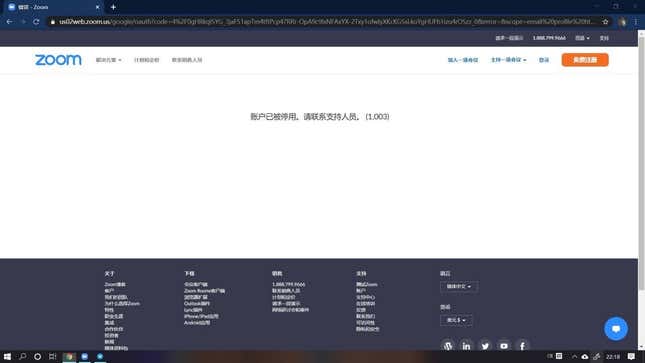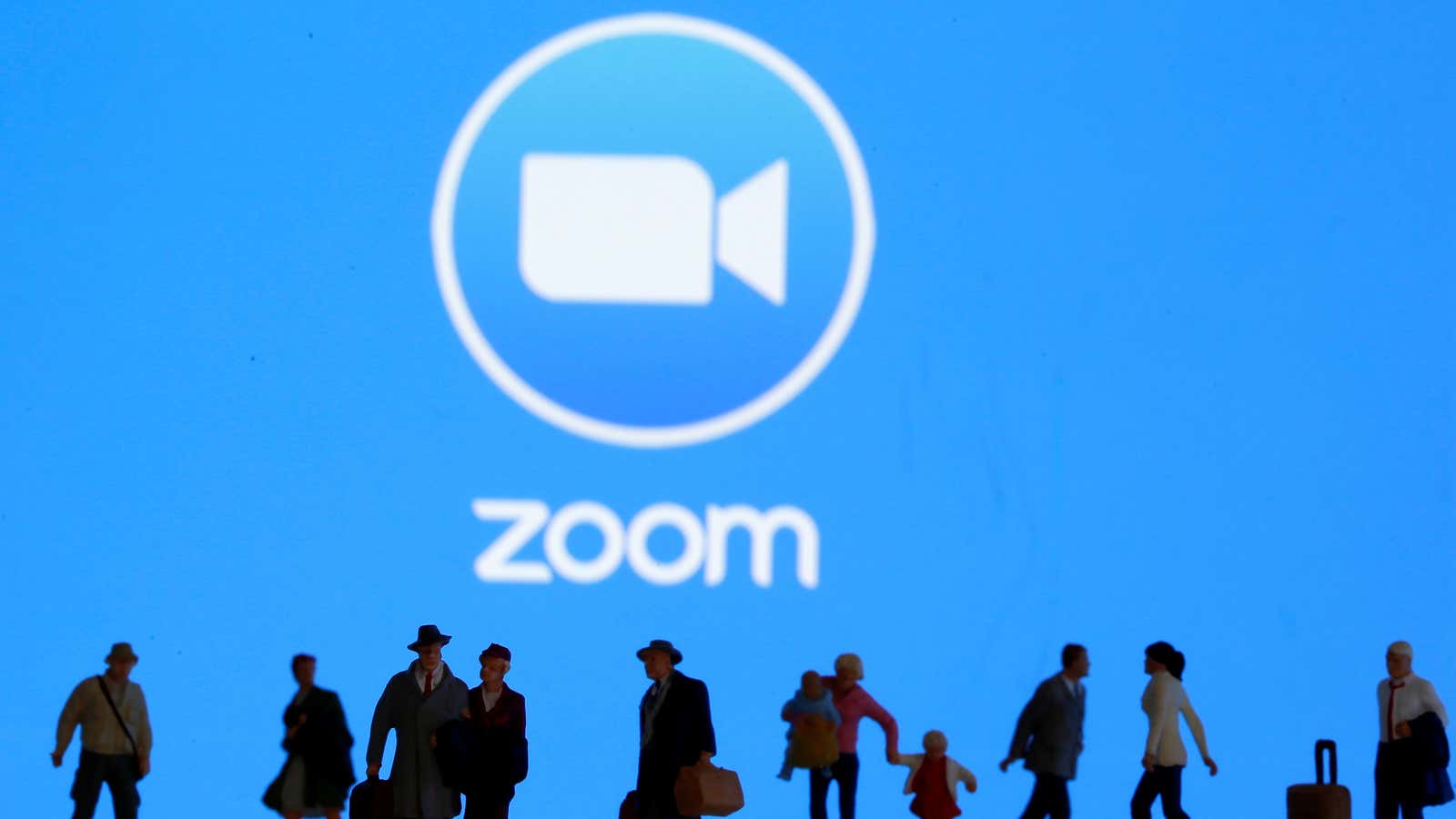The overnight success of Zoom, buoyed by the coronavirus lockdowns, has led to growing concerns about how the video-conferencing tool handles privacy and security. Add scrutiny from Beijing to the list of reasons to feel uneasy about the platform.
Founded by Chinese-American entrepreneur Eric Yuan (paywall) the company is facing a backlash after it was found to have suspended the paid account of Humanitarian China, a group of exiled pro-democracy Chinese activists. The suspension, first reported by Axios, came after the organization held a Zoom meeting on May 31 that was attended by around 250 people, including some in China, to commemorate the 1989 Tiananmen student protests and crackdown.
The group discovered Zoom had suspended the account on June 7, according to Zhou Fengsuo, who was a student leader during the pro-democracy protests and now serves as president of Humanitarian China. A screenshot provided by Zhou to Quartz showed a notice in Chinese that read “this account has been suspended, please contact support staff.” Zhou said he wasn’t notified in advance, and only discovered the status change when activists of the group tried to log in to the account, which was registered in the US and uses Chinese as its default language. It’s unclear if other users on the call were also affected.

Zoom said in a statement on the suspension that it was required “to comply with laws in the countries where we operate.”
“Our platform is increasingly supporting complex, cross-border conversations, for which the compliance with the laws of multiple countries is very difficult,” the company added. “We regret that a few recent meetings with participants both inside and outside of China were negatively impacted and important conversations were disrupted. It is not in Zoom’s power to change the laws of governments opposed to free speech.”
The company didn’t clarify which specific laws the account fell foul of. By Wednesday (June 10), it quietly reactivated the account.
Zhou said he was not satisfied with the explanation, and that it suggested the company “made the move apparently due to pressures from Beijing.”
“I would like to know what are the specific laws the company referred to for suspending the account?” said Zhou.
The Zoom account of Lee Cheuk-yan, a Hong Kong politician and activist who organizes the city’s annual June 4 vigil to remember those died during Beijing’s bloody crackdown on the protesters, was also shut down by the company on May 22, according to AFP. Lee had to use another Zoom account to attend the online commemoration on May 31, said Zhou. Each year, as the June 4 date approaches, people living in China experience an uptick in online censorship—but the Zoom account suspensions affected users outside the mainland. Lee said he had asked the company whether the closure was due to “political censorship” but has yet to get an answer, according to AFP.
The company said in its statement that in “situations where local authorities block communications for participants within their borders, Zoom is developing additional capabilities that protect these conversations for participants outside of those borders.”
Amid mounting suspicion of apps that have ties with China, the incident is sure to exacerbate worries about using Zoom in the US and elsewhere. Josh Hawley, a Republican senator famous for his challenges to China-linked apps, such as short video app TikTok, tweeted that Zoom’s explanation of “complying with local laws” equals to “censoring for Beijing,” while Bill Bishop, the author of popular China newsletter Sinocism, also tweeted that the software “is more of a security risk to Americans than huawei is right now.”
Even prior to the move against the exiled dissidents, a number of governments have barred or restricted the use of Zoom due to worries about its security risks.
The California-based company, which has a research-and-development workforce in China, acknowledged in April that some of its free calls were “mistakenly” routed through data centers in China, although this practice has been changed since. Zoom also won’t provide end-to-end encryption to free users because it wants to “work together” with local law enforcement in case Zoom is misused for criminal purposes, Yuan said at a meeting of investors last week.
Some of the concerns involve facets of the app that make it easy to use. Researchers say the randomly-generated IDs of meeting participants, for example, are easy to crack and could potentially grant anyone access to private meetings.
The company said in its statement that it doesn’t eavesdrop on meetings or allow law enforcement to listen in on them. “Any reports to the contrary are categorically false. Zoom does not proactively monitor meeting content and we do not have backdoors where anyone—including employees—can enter meetings without being visible to others,” it said.
Still, it may be hard for users to find substitutes for Zoom overnight, as its rivals have their own drawbacks, whether it’s cost, encryption, or limits on the duration of calls or number of participants. As of April, the company had 300 million daily meeting participants, compared with just 10 million in December as the coronavirus outbreak forced people around the world to work from home.
This isn’t the first time Zhou has found his online presence silenced by a tech company whose business interests span from the US to China. Last year, he announced his LinkedIn account was blocked from public view in China, but the company reversed the move after reporters picked up the story. Zhou tweeted at the time that “this is how censorship spread(s) from Communist China to Silicon Valley in the age of globalization and digitalization”—a comment that applies just as much to the new China-linked tech companies that are starting to flourish overseas.
Update, June 11: This story was updated soon after publication with a statement from Zoom.
